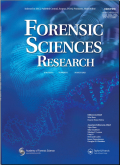法庭科学研究(英文)2024,Vol.9Issue(2):83-86,4.DOI:10.1093/fsr/owae027
Case reports on uniparental disomy of chromosomes 6 and 3 in paternity testing
Case reports on uniparental disomy of chromosomes 6 and 3 in paternity testing
摘要
关键词
forensic genetics/paternity testing/uniparental disomy/STR/SNP/MPSKey words
forensic genetics/paternity testing/uniparental disomy/STR/SNP/MPS引用本文复制引用
He Ren,Zhiyong Liu,Chong Chen,Yan Shi,Jiarong Zhang,Ying Chen,Li Jia,Yacheng Liu,Jiangwei Yan..Case reports on uniparental disomy of chromosomes 6 and 3 in paternity testing[J].法庭科学研究(英文),2024,9(2):83-86,4.基金项目
This work was supported by the grants from the Open-Fund of Shanghai Key Lab of Forensic Medicine,Key Lab of Forensic Science,Ministry of Justice,China[grant num-ber KF202011]and National Natural Science Foundation of China[grant number 82030058]. ()

